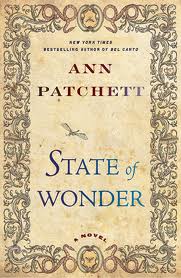Ann Patchett
Harper Collins
|
The question is whether or not you choose to disturb the world around you, or if you choose to let it go on as if you had never arrived. That is how one respects indigenous people. If you pay any attention at all you’ll realize that you could never convert them to your way of life anyway… The point, then, is to observe the life they themselves have put in place and learn from it. from State of Wonder |
Different heart, different darkness
“It is a tale that leads the reader into the very heart of darkness,” trumpets the blurb on the book cover.
I suppose the comparison to Heart of Darkness was inevitable. Any story that has the hero go up a jungle river and encounter an eccentric character living among the natives must, almost by edict, be compared to Conrad’s masterpiece.
But although Ann Patchett, author of the bestselling Bel Canto, uses a similar jungle setting, her story has a different heart and suggests a different darkness.
When Dr. Marina Singh receives news of the death of her research colleague, last heard from in the depths of the Amazon, the pharmaceutical company they work for sends her to find out what happened to him, and to complete his mission: locating the reclusive and elusive Dr. Annick Swenson, whose research project the company has been bankrolling for a number of years.
Dr. Swenson is working on a wonder drug that will allow women to bear children even into their sixties (For some reason this is seen as a good thing.)
The book momentarily lags when Marina is stuck for several weeks in a Brazilian outpost, waiting for Dr. Swenson to return from upriver, and we feel stuck with her. But the story finds its pace once she at last meets Dr. Swenson, a truly memorable character—brilliant, imperious, almost monomaniacal in her dedication to the project, and who has little regard for society and social conventions (“Society is nothing but a long, dull dinner party conversation in which one was forced to speak to one’s partner on both the left and the right.”)
Unlike Marlow’s encounter with Kurtz and the horror his madness created, Marina discovers a world of incredible beauty as well as danger, an indigenous people who both intrigue and bewilder her, and humor and tenderness in a twelve-year old deaf orphan who becomes a guide into her own heart.
And finally, very much unlike Conrad’s work, State of Wonder’s ending leaves the reader not with a sense of horror at our humanity, but with a strange mix of joy and sadness, for what has been found, and for what has been lost; much like life.
This review first appeared in The Columbia River Reader (September 15 - October 14, 2011). Reprinted with permission.




